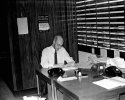Heartland
master brummie
The way staff worked on the railways has changed with time and many types of jobs have disappeared
Local stations often dealt with parcels traffic and sometimes freight. There were station masters and platform staff and now the staffing at local stations can be limited to one or no staff on a shift.
There was a time when there were dedicated staff for seat and sleeper reservations which now can be done on line. British Railway had coaching stock for which seats could be reserved and the sleeper and motor rail had reservation systems. The Sleeper train to Scotland would pass through Birmingham New Street and people could reserve a berth in a second class sleeper or have the exclusive right, at a cost, for a first class sleeper.
At New Street station there was a dedicated reservation office that was part of the travel centre where train enquiries were dealt with and advance bookings made. Arrangements to have a British Rail hotel could be made and there was a special booking office for Continental travel and car ferry bookings as well as rail -air bookings.
Much was lost with railway privatisation and such services were often sent out to the private sector. Behind the booking office was a telephone enquiry office where people could phone in, Nowadays Train Line has a role although with Great British Railways it will be of interest to see what will happened next.
A member of staff at the reservation desk, New Street where the phone line was the principal means of arranging reservations and the paper allocation of seats and sleepers was held on clipboards

Local stations often dealt with parcels traffic and sometimes freight. There were station masters and platform staff and now the staffing at local stations can be limited to one or no staff on a shift.
There was a time when there were dedicated staff for seat and sleeper reservations which now can be done on line. British Railway had coaching stock for which seats could be reserved and the sleeper and motor rail had reservation systems. The Sleeper train to Scotland would pass through Birmingham New Street and people could reserve a berth in a second class sleeper or have the exclusive right, at a cost, for a first class sleeper.
At New Street station there was a dedicated reservation office that was part of the travel centre where train enquiries were dealt with and advance bookings made. Arrangements to have a British Rail hotel could be made and there was a special booking office for Continental travel and car ferry bookings as well as rail -air bookings.
Much was lost with railway privatisation and such services were often sent out to the private sector. Behind the booking office was a telephone enquiry office where people could phone in, Nowadays Train Line has a role although with Great British Railways it will be of interest to see what will happened next.
A member of staff at the reservation desk, New Street where the phone line was the principal means of arranging reservations and the paper allocation of seats and sleepers was held on clipboards

